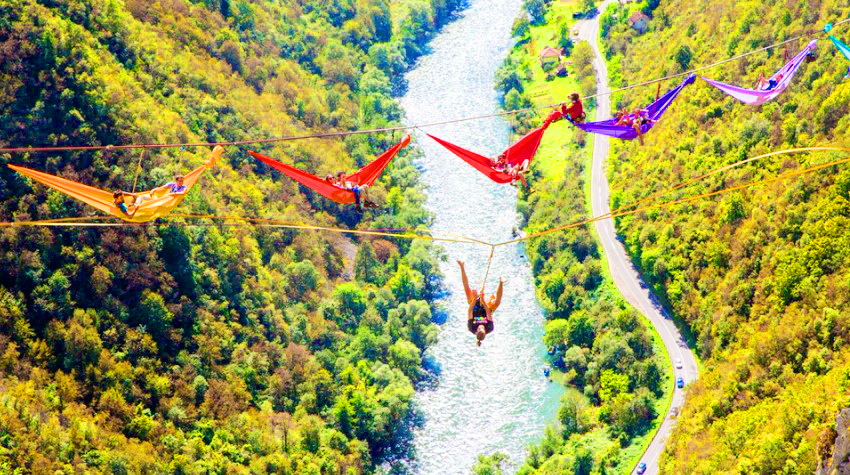Introduction
Adventure, a word that evokes excitement, curiosity, and the spirit of exploration, has been a driving force behind human progress and self-discovery for millennia. From daring expeditions to unknown lands to adrenaline-pumping activities that challenge our limits, adventure fuels our desire to break free from the routine and experience the extraordinary. In this article, we will dive into the essence of adventure, its significance in our lives, the psychology behind seeking it, and the transformative power it holds in shaping our perspectives and personal growth.
I. The Meaning of Adventure
1.1 Defining Adventure
Adventure can be described as any experience that involves taking risks, stepping outside of one’s comfort zone, and embarking on journeys that often lead to the unknown. It is about embracing uncertainty, excitement, and the potential for growth.
1.2 The Essence of Adventure
Adventure is not solely about conquering mountains or traversing uncharted territories; it can also be found in everyday activities that challenge our perceptions and ignite our curiosity. Embracing adventure allows us to live more fully and meaningfully.
II. The Psychology of Seeking Adventure
2.1 The Call of the Unknown
Humans are naturally curious beings, driven by a desire to explore and understand the world around them. Adventure taps into this innate curiosity and compels us to venture beyond the familiar.
2.2 Dopamine and the Adventure High
Engaging in adventurous activities triggers the release of dopamine, a neurotransmitter associated with pleasure and reward. This “adventure high” reinforces the desire to seek new experiences and take risks.
2.3 Overcoming Fear and Building Resilience
Adventure often involves confronting fear and uncertainty. By pushing our boundaries, we develop resilience and a greater sense of self-confidence.
III. The Types of Adventure
3.1 Physical Adventures
Physical adventures encompass activities like hiking, rock climbing, skydiving, surfing, and other adrenaline-pumping pursuits that challenge our physical abilities.
3.2 Cultural Adventures
Cultural adventures involve immersing oneself in new cultures, traditions, and ways of life through travel, volunteering, or living in a foreign country.
3.3 Intellectual Adventures
Intellectual adventures focus on expanding knowledge and skills through pursuits such as learning new languages, exploring scientific theories, or pursuing higher education.
3.4 Creative Adventures
Creative adventures involve exploring artistic expressions like painting, writing, photography, or music, allowing individuals to tap into their creative potential.
IV. Adventure and Personal Growth
4.1 Stepping Out of the Comfort Zone
Adventure forces us out of our comfort zones, challenging us to adapt, learn, and grow. It fosters resilience, adaptability, and the ability to embrace change.
4.2 Cultivating Mindfulness
Adventure often takes us into the present moment, heightening our awareness and mindfulness. Being fully engaged in the experience enhances our connection with the world around us.
4.3 Expanding Perspectives
Venturing into unfamiliar territory opens our eyes to diverse perspectives and cultures, promoting empathy and understanding.
4.4 Fostering Humility
In the face of unpredictable circumstances, adventure teaches us humility and the acceptance of our limitations.
V. Balancing Safety and Adventure
5.1 Risk Assessment
While adventure involves risk, responsible adventurers engage in careful risk assessment to ensure their safety and the safety of others.
5.2 Preparedness and Training
Being adequately prepared and trained for adventurous activities minimizes risks and enhances the overall experience.
5.3 Environmental Conservation
Responsible adventurers prioritize the preservation of natural habitats and practice Leave No Trace principles to minimize their impact on the environment.
VI. Adventure and Connection
6.1 Building Meaningful Relationships
Shared adventures create strong bonds between individuals, fostering deep and meaningful connections.
6.2 Adventure Communities
Engaging in adventure often leads to involvement in adventure communities, where enthusiasts come together to share experiences and support one another.
Conclusion
Adventure is more than just a pursuit of excitement; it is a catalyst for personal growth, self-discovery, and a deeper connection with the world around us. By embracing uncertainty, stepping outside our comfort zones, and seeking new experiences, we open ourselves to the transformative power of adventure. Whether it’s a physical, cultural, intellectual, or creative adventure, the journey towards the unknown shapes our perspectives, builds resilience, and enriches our lives with a sense of fulfillment and purpose. Embrace the spirit of adventure, embark on new journeys, and let the thrill of the unknown guide you towards a more enriching and fulfilling existence.











